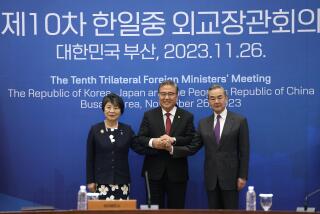Optimism at Hu-Abe Summit
- Share via
BEIJING — President Hu Jintao on Sunday termed his hastily arranged summit with Japanese Prime Minister Shinzo Abe a “turning point,” amid early hints of a breakthrough in troubled Sino-Japanese relations.
A look at the details coming out of the summit, however, suggests how difficult it will be to bridge decades of distrust. A key bilateral irritant -- whether the new Japanese leader, unlike his predecessor, will swear off visits to the controversial Yasukuni Shrine that memorializes several war criminals among Japan’s war dead -- was papered over. Nor was there any agreement over whether to impose sanctions should North Korea conduct a nuclear test. Reports today said that such a test had occurred.
Tokyo and Beijing had urged North Korea to renounce its nuclear threat and return to the bargaining table.
“Japan and China shared the view that North Korea’s nuclear test is unacceptable,” Abe said at a news conference late Sunday, before reports of the test. “And this is a strong message to North Korea.”
Japan has taken a harder line against the government in Pyongyang recently, whereas China, North Korea’s closest ally, still favors quiet diplomacy.
In meetings Sunday that also included Chinese Premier Wen Jiabao and parliament chief Wu Bangguo, the two sides reportedly discussed historical disputes, expressed hope for improved bilateral relations and agreed in principle that Hu would visit Japan. They also pledged to raise their relationship to a strategic level.
Analysts say each nation’s view of history has been a major impediment, but the real issue is competition for influence in northeast Asia.
Japan, long the region’s economic and political giant, now faces a rising and increasingly brash China competing for energy and territory in the East China Sea. The transition also coincides with Tokyo’s bid to rewrite its pacifist constitution and revive its military, suppressed after World War II.
“The main problem in Sino-Japanese relations is not history, but the change in balance of strength,” said Li Hanmei, associate professor of international relations at Peking University. “Neither side is able to see the other clearly now, and the two nations are yet to find common interests.”
For China, the promise of improved Sino-Japanese relations offers hope that regional tensions won’t derail economic growth, seen as central to domestic stability and continued Communist Party control. Beijing also wants to prevent an even closer U.S.-Japanese relationship that might see the two encircle China militarily in a bid to contain the nation’s rise in power.
This initiative is not without political risk for Hu, however, given strong nationalist and anti-Japanese sentiment among Chinese citizens.
“I’ve always been suspicious of Japanese and don’t trust Abe, but we can always hope,” said Liu Min, 38, a newspaper seller in Beijing.
Analysts said Abe’s appearance on the political stage presented both sides with a political opening.
“Abe was once a very tough nationalist, but he has softened on the history issue, which shows he’s becoming more pragmatic,” said Huang Dahui, an international studies professor at the People’s University in Beijing.
Abe, who arrived in South Korea today, hopes this bold overture early in his administration will burnish his weak foreign policy credentials. By making the first move with China and South Korea, he also hopes Japan will gain the initiative in long-simmering disputes.
Closer to home, Abe is betting that improved China relations will blunt a key opposition issue and boost the fortunes of his ruling Liberal Democratic Party before the next election. Finally, Abe, 52, the first Japanese prime minister born after World War II, wants to show that a new generation can be flexible and friendly with its neighbors. Traditionally, new prime ministers make their first foreign visit to Washington.
“Sixty years of Japan’s postwar history is built on our deep remorse for our country inflicting grave damage and suffering that left scars on the people of Asia,” Abe said. “I feel certain that my visit to China this time will lead Sino-Japanese ties to a higher level.”
In advance of the visit, both sides gave some ground. Abe reaffirmed Japanese Prime Minister Tomiichi Murayama’s 1995 statement expressing “deep remorse” for Japan’s brutal occupation of China. And he cited the legitimacy of the Tokyo tribunal, which tried and convicted several Japanese war criminals. China, in turn, has toned down its insistence on a clear Yasukuni policy, as Abe hedges his bets.
Some, however, say China has left itself an escape hatch if Sino-Japanese relations founder again. “It’s very typical of Chinese diplomacy to give the other guy enough rope to hang himself with,” said Andrew Nathan, a China specialist at Columbia University. “You reiterate your long-standing requests for the relationship and you wait to see what he does. If things don’t go well, then it wasn’t your fault.”
--
Yin Lijin in The Times’ Beijing Bureau contributed to this report.
More to Read
Sign up for Essential California
The most important California stories and recommendations in your inbox every morning.
You may occasionally receive promotional content from the Los Angeles Times.













